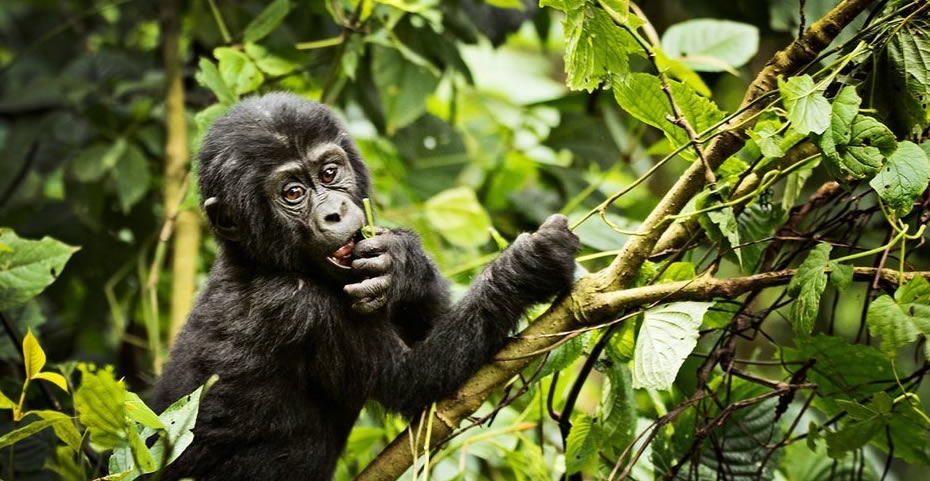As the world locked away in isolation to seek refuge from covid-19, the mountain gorillas too locked away in the jungle impenetrable forests for months since they didn’t have any tourists coming to visit them. Like it is believed, there was a human baby boom during the silence of covid-19 pandemic. Also, the mountain gorillas were very active in the jungle that many babies have been recorded born during the pandemic.
When covid-19 broke out in late 2019, it caused so much harm to the lives of the people both in health and economical aspects. The worst was expected for the gorillas due to their vulnerability. Humans and other apes share 98% DNA genetic components and zoonotic diseases have been transmitted between the two causing a huge number of deaths in the past times. To be specific, one of the reasons why the gorillas in the Central East African tropical forest region are critically endangered is because of the past outbreak of Ebola which was transmitted between the humans and the gorillas and led to uncountable deaths.
Basing on the past endemic experiences, researches and studies were made at the start of the Covid-19 pandemic and it was found that primates are susceptible as humans to the coronavirus. This is because they have the same Angiotensin Converting Enzyme protein receptors which the coronavirus attaches to it. This made it clear that the gorillas were prone to Covid-19 since they are likely to get close to park staff, conservationists, researchers, tourists and the local people around the park. The transmission of covid-19 from humans to gorillas did not take long, in January 2021 after one year of the outbreak, eight gorillas tested positive of Covid-19 at the San Diego Zoo Safari Park having contracted the virus from an asymptomatic Zoo Keeper. Covid-19 was discovered from these gorillas through fecal testing. The silverback of 48 years developed serious signs of the virus and the young ones had mild ones. This implied that covid-19 was not only a human problem but also a threat to the existence of primates in the wild.
For the endangered mountain gorillas found in Bwindi impenetrable national park of Uganda, Covid-19 has had a mixed impact of positives and negatives. We have witnessed the growing number of mountain gorillas in the forests and also some abysmal things have happened to the gorillas and the gorilla tourism sector.
The baby Boom in Bwindi Impenetrable Forest National Park During Covid-19
The mountain gorillas are known to have a low reproduction rate and it is one of the reasons for their marginal population in the world. The baby booms in Bwindi Impenetrable National Park has raised eyebrows as it was contrary to what was expected at the start of Covid-19. The baby booms came with analogies that mountain gorillas’ low birth rate in the past years before covid-19 was because of human presence that left them with no privacy to have time to make babies. A whooping number of 17 new gorilla births has been registered among the various gorilla groups in Bwindi from 13th March 2020, (the time covid-19 escalated in Uganda) up to date (as the tourism industry sets to be revamped).
The baby booms that have prevailed in Bwindi impenetrable national park during Covid-19 are as follows;
Uganda closed its national parks on the 21st march 2020 when its first case of Covid-19 was announced but at the start of March 2020, the number of tourists visiting the various national park in Uganda had already drastically reduced. Henceforth, the first gorilla baby boom of covid-19 era took place on the 13th March, 2020 when Biretwa one of the Adult female gorillas in Mishaya family, Rushaga sector was seen with a newly born gorilla. This brought to the number of gorillas in the group to 12 members.
In just a space of one month and a half on the 10th May 2020, there was double births. One from Nshongi family found in Rushaga sector. This is largest family in the park and the new baby became the 26th member of the family. The other birth on this day was from Muyambi group, the newest habituated family in Buhoma sector.
In the last week of July 2020, another double birth of gorillas was announced. Nyampazi, female adult from Mubare group in Buhomo gave birth to a new baby on the 22nd of July 2020. This increased the family from 8 to 9 members. Oruzongo katoto of Oruzungo group in Ruhija sector also delivered a cute baby on the 25th july 2020. This was katoto’s first birth. The number of the group came to 15 individuals.
On the 28th August, Uganda Wildlife Authority announced that Kibande of Rushengura family in Buhoma had given birth to a baby gorilla and this brought its population to 17 members.
After 3 days had gone by, another mother gorilla from Rushegura group, Ruterana also delivered a baby to make to bring the population of the group to 18 members
On the 5th September 2020, Nshuti from Nyakagezi family was seen holding a newly born baby gorilla. Nyakagezi family is a group from Mgahinga national park, another gorilla habitat in Uganda. Nyakagezi is actually the only habituated gorilla group in the park.
In just 2 days after a baby birth had been announced in Mgahinga national park, Bwindi impenetrable National park was on a pounce again. Ndinkahe aged 16, a mother gorilla from Mucunguzi family in Rushaga sector produced a new gorilla, adding their population to 12 individuals.
Ruhija sector hosted another baby boom from Twijukye, a mother gorilla of Mukiza group. The newly born became the 15th member of the family. The birth took place on the 11th of October 2020
A week and some few days gone by (21st October 2020), there was another baby boom announcement, Kutu Family from Rushaga sector welcomed a baby. This was the second birth of the female adult.
On the 11th Novermber 2020, Rushegura family embraced the third birth in the year. This time it was from Munyana. This birth marked the end of the baby booms in 2020.
This indicated that 2020, the peak year of Covid-19 provided the highest number of gorilla births in the history of Bwindi impenetrable national park. 13 baby gorillas were born among the different gorilla groups in the different park sectors.
At the start of 2021, gorilla trekking was open but the number of tourists was very low and Covid-19 was still roaming around the world. The gorilla babies also continued to boom.
At the start of 2021 on 4th January, Nderema from Nkuringo sector surprised us with a baby. This was her second birth, the first one had died in 2018. The newly born became the 12th member of the family.
It took a while to get another baby boom and it happened after five months on the 15th of May 2021. Uganda Wildlife Authority announced that Bitukura had gotten a new member, making 13 individuals in the family.
After two months, on the 31st july 2021, Bitukura in Ruhija received another new member from ADT Kanoel, increasing its population to 14 individuals.
Lastly, two months ago on the 27th September 2021. We celebrated the World Tourism Day with a newly born baby from Mishaya family in Rushaga.
Apart from the baby boom in the park, the forest got some breathing space due to the absence of tourists. The fragile environment became virgin again and its scenery was breath taking to look at.
The Negative Impact of Covid-19 to The Gorillas in Bwindi Impenetrable National Park
As explained above, the number of mountain gorillas in Bwindi Impenetrable national park increased miraculously during the Covid-19 period. This made people murmur that may be the gorillas were better off without tourism. However, they forgot that lots of plights happened against the gorillas and Bwindi impenetrable national park.
For instance poaching went on a rise in the park. The absence of tourism during Covid-19 period majorly contributed to the killing of Rafiki, a silverback gorilla of Nkuringo family in Bwindi impenetrable forest. On the 1st June Rafiki was killed by a hungry and desperate local who was trying to hunt down duikers and bush pigs for food and trade at the local market. When he speared the bush pig, the loud screams from the pig prompted Rafiki to charge towards him in protection of its family. To defend himself, the hunter speared down Rafiki. The death of rafiki was detrimental to the gorilla conservation and its population. This demise destabilized Nkuringo family and it took it a while to get stable.
In addition, numerous snares were found in Bwindi forest during the first lock down in Uganda when all national parks were closed. Ugandans do not eat gorillas but the snares were for other animals like forest hogs, bush pigs and duikers. Nonetheless, snares could easily harm the gorillas since they were staged in their localities.
There has been loss of revenue and employment during Covid-19 period. Before Covid-19 in the fiscal year of 2018/19, more than 40,000 gorilla permits were purchased, a 40% increase on the year before. Due to the loss of income, the park struggled to monitor, manage and protect the gorillas as they lucked fund to facilitate the conservation works.
More to that, in the tourism industry over 500, 000 jobs were lost according to the Uganda Tourism Board. These include the local communities around the park that sell craft items, fresh fruits and food to the visitors. Without the income, the local people raided Bwindi forest in search for food as they carried out poaching on animals like duikers and bush pigs. This destabilized the gorillas and other animal species as they were invaded from time to time.
In conclusion therefore,Covid-19 had some positive and negative impacts on the mountain gorillas in Bwindi. There was a huge rise in the number of gorillas in the park as the gorilla groups had baby booms like never before. Negatively, the gorillas were destabilized by the poachers and their activities led to the eventual death of Rafiki, a legendary silverback in Nkuringo family.



